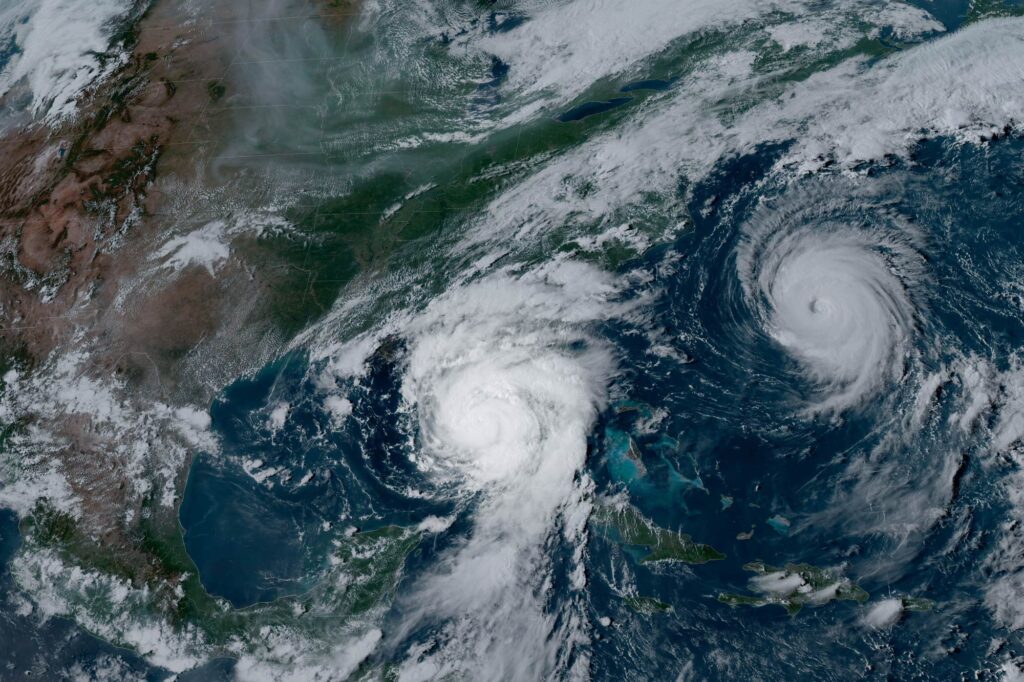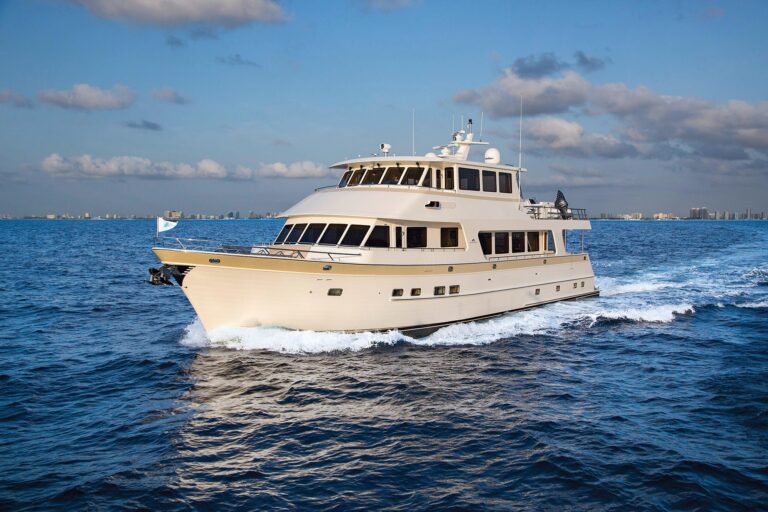
Hurricane Irene was bearing down on Long Island, New York, and my boat was in its path. I had the yard haul my boat, and it was placed up high at the back of the yard. There was no storm surge, and everything went according to plan. My boat was back in the water in no time.
When Superstorm Sandy appeared a year later, I once again called the marina to haul the boat. This time, it was placed in a lower section of the yard. The historic storm surge picked my boat off its jack stands. Luckily, my brother had also chained the boat to the marina’s facedock. The furthest it could travel was about 40 feet—and it did. It landed on top of a dumpster. There was damage, but the boat was saved. -Patrick Sciacca, Editor-In-Chief, Yachting
As seen above, we can’t control everything, but preparing your boat for a hurricane isn’t just about protecting your investment—it’s about safety and responsible ownership. Proper hurricane preparedness can be the difference between minor repairs and a total loss. While common sense plays a measurable role, it never hurts to review and refresh the steps when hurricane season is here.
General hurricane preparedness tips include:
- Creating a written hurricane plan specific to your vessel
- Keeping an inventory of all equipment and documentation
- Maintaining emergency contacts including your marina, insurance agent, and boat storage facilities
- Staying informed about weather forecasts throughout hurricane season
Protecting and Securing Your Boat
When a hurricane threatens, properly securing your vessel is critical. Start by removing all loose items from your boat, including canvas covers, Bimini tops, and electronics that can be easily damaged. If possible, remove sails completely to reduce wind resistance.
For boats in the water:
- Use extra lines to secure your vessel, ideally with longer, thicker lines that allow for storm surge
- Add chafe protection where lines contact the boat
- Place fenders strategically to prevent damage from collisions with docks or other boats
- Secure hatches, windows and doors to prevent water intrusion
- Disconnect shore power and secure or remove antennas and outriggers
For trailered boats:
- Secure the boat to the trailer with multiple tie-downs
- Fill the boat partially with water for added weight
- Place the trailer on high ground away from potential flooding
- Consider using ground anchors for additional stability
Where to Store Your Boat During a Hurricane
Choosing the right location to store your boat during a hurricane requires careful consideration of several options.
Marinas and Harbors: While convenient, marinas can become dangerous during storms due to potential “domino effect” damage from other vessels. If keeping your boat at a marina, ensure it has hurricane-rated docks and protection from storm surges.
Dry Storage: Many boat owners prefer professional dry storage facilities, which can provide better protection from wind and water. However, these facilities fill quickly when hurricanes threaten, so arrangements should be made well in advance.
Personal Property: If feasible, storing your boat on high ground away from flood-prone areas on your own property can be effective. Ensure the boat is properly secured and protected from falling debris.
Hurricane Holes: Natural harbors or coves that provide protection from wind and waves are traditional safe havens, but competition for these spaces intensifies before storms.
When selecting storage, consider:
- Distance from coastal surge areas
- Protection from wind
- Accessibility before and after the storm
- Security during evacuation periods
Insuring Your Boat for Hurricane Season
Adequate insurance coverage is a crucial component of hurricane preparedness. Standard boat insurance policies may not fully cover hurricane damage, so it’s important to:
- Review your policy annually before hurricane season begins
- Understand deductibles specifically for named storms, which are often higher
- Consider comprehensive coverage that includes hurricane damage
- Verify coverage for salvage operations, environmental cleanup, and wreck removal
- Document your boat’s condition with photos and video before hurricane season
Many insurers require specific hurricane preparedness plans as conditions of coverage. These might include designated storm haul-out locations or specific securing protocols. Failure to follow these requirements could invalidate claims, so understand your policy thoroughly.
Making Claims for Damage After a Hurricane
If your boat sustains damage despite your best preparations, knowing how to navigate the claims process is essential:
- Immediate Documentation: As soon as safely possible, document all damage with photographs and video before beginning any cleanup or repairs.
- Contact Your Insurer Promptly: Report the damage quickly, as claims services may be overwhelmed after major storms.
- Mitigate Further Damage: Take reasonable steps to prevent additional damage, which is typically required by insurance policies.
- Detailed Inventory: Prepare a comprehensive list of all damaged items and estimated repair costs.
- Professional Assessment: Consider having a marine surveyor assess the damage for larger claims.
- Track All Expenses: Keep receipts for emergency repairs and other storm-related expenses that might be reimbursable.
- Be Patient But Persistent: Hurricane claims can take longer to process due to high volume, but stay in regular contact with your claims adjuster.
Hurricane preparedness for boats requires planning, diligence and an understanding of both your vessel’s needs and your insurance coverage. By being proactive to secure your boat properly, choosing appropriate storage locations, maintaining adequate insurance and knowing how to handle the claims process, you can significantly reduce the risk of catastrophic loss. Hurricanes are unavoidable in many boating locales, but proper preparation can make recovery faster and less costly. Material possessions, including boats, can be replaced, but lives cannot.








